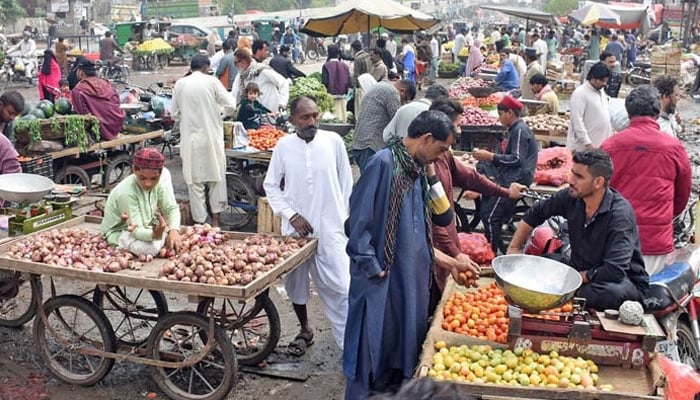Price hike irks Pindiites
The price of everything ranging from food to transportation to house rent has soared distressingly. The rise has been constant. Despite a raise in the salaries of certain sectors, it has been harder for both fixed and non-fixed-income earners to make ends meet.
“The price of daily essentials bewilders me. The price of food and non-food items has shot up. I have made big compromises in the living standard of my family to endure the price hike of food and transport. Still, I am finding it more and tougher to pay for the food we used to have before,” says Nusrat Ali, a sales clerk working at a marketing company.
“To send my daughter and son to a school while having decent food on the table, I am thinking about taking up a part-time job, says Altaf Ali, a school teacher.
“I live in an area along the railway track in Loi Bher Railway Scheme with my four children and my wife, a domestic help, and dread that I might fail to pay the increased rent, following which my family may be evicted anytime,” says Safdar Hussain, a labourer.
“Being a middle-class family I have more than one wage-earning member. But our standard of living has not improved in any meaningful sense as the family earnings have been lagging far behind the growth rate of prices of daily essentials,” says Asif Hasan, an employee of a private company.
“Customers think that we profit enormously from the trade and keep bargaining. They fail to see that we are as vulnerable to wholesalers’ prices as they are. I swear by God that we make a nominal profit and have no control over the price of the products we sell,” says Sajjad Rizvi, who sells fruits and vegetables near the Airport Housing Society rail crossing.
“The present inflation cannot be explained with regular economic reasoning only. The government’s lack of control over the market is also responsible for it. The intermediaries are also greatly responsible for raising the price of everything. Various large interest groups also create an artificial food shortage through speculative trading “says Mohsin Abbas, an economics professor at a local university.
“While the government has little control over the price issues, it surely has the means to hold back the growing rate of food items. In addition, the government can take measures to enhance the wage growth rate. If it doesn’t take any of these steps, a tremendously large population will suffer,” says Karim Zaidi, who works in a government ministry.
Tehreem Fatima says, “In an abnormal market like ours the rising price of food commodities cannot be explained by demand and supply phenomenon alone. That lies only in the textbooks. There are man-made reasons as well like hoarders and black marketers.”
-
 Worst Cricket Moments That Shocked The Game
Worst Cricket Moments That Shocked The Game -
 Prince Harry, Meghan Markle Reach A Crossroads: ‘You Could Lose Everything’
Prince Harry, Meghan Markle Reach A Crossroads: ‘You Could Lose Everything’ -
 F1 Title Race: Who Will Win 2026 Drivers’ And Constructors’ Championships?
F1 Title Race: Who Will Win 2026 Drivers’ And Constructors’ Championships? -
 New Observatory Sends 800,000 Asteroid Alerts In One Night
New Observatory Sends 800,000 Asteroid Alerts In One Night -
 Cher’s Son Elijah Blue Allman Apprehended On Two Counts Of Assault At Elite Prep School
Cher’s Son Elijah Blue Allman Apprehended On Two Counts Of Assault At Elite Prep School -
 Beatrice, Eugenie Now Face Andrew, Sarah's ‘nightmares’: 'They're Hugely Conflicted'
Beatrice, Eugenie Now Face Andrew, Sarah's ‘nightmares’: 'They're Hugely Conflicted' -
 X Debuts Topic Filtering To Help Users Shape Their ‘For You’ Recommendations
X Debuts Topic Filtering To Help Users Shape Their ‘For You’ Recommendations -
 Scientists Built World's First Computer That Learns Like Human Brain
Scientists Built World's First Computer That Learns Like Human Brain -
 Robert Carradine’s Daughter Makes Bombshell Confession As Actor's Death Cause Confirmed
Robert Carradine’s Daughter Makes Bombshell Confession As Actor's Death Cause Confirmed -
 Beatrice, Eugenie Put On Blast: ‘Only Nitwits Wouldn’t See An Association With A Pedophile As Toxic’
Beatrice, Eugenie Put On Blast: ‘Only Nitwits Wouldn’t See An Association With A Pedophile As Toxic’ -
 OpenAI Defies Industry Pressure, Secures Guardrails Under New US Defense Department Pact
OpenAI Defies Industry Pressure, Secures Guardrails Under New US Defense Department Pact -
 'Sinners' Delroy Lindo Breaks Silence On BAFTA's Tourette’s Incident At NAACP Image Awards
'Sinners' Delroy Lindo Breaks Silence On BAFTA's Tourette’s Incident At NAACP Image Awards -
 Billy Joel Admits Cancelling Of Tour Due To Brain Disorder 'sounds A Lot Worse' Than It Is
Billy Joel Admits Cancelling Of Tour Due To Brain Disorder 'sounds A Lot Worse' Than It Is -
 US And Israeli Strikes On Iran: Everything You Need To Know
US And Israeli Strikes On Iran: Everything You Need To Know -
 US Strikes On Iran Ignite Emergency Push For Powers Legislation: Report
US Strikes On Iran Ignite Emergency Push For Powers Legislation: Report -
 Kelly Osbourne's Mom Sharon Receives 'shut Up' Call Accepting An Award For Late Hubby?
Kelly Osbourne's Mom Sharon Receives 'shut Up' Call Accepting An Award For Late Hubby?




